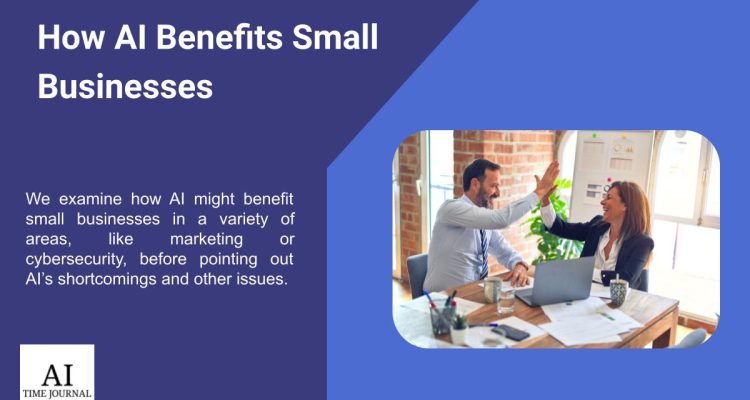
In today’s competitive landscape, small businesses often face challenges in competing with larger companies. From financial struggles to workflow inefficiencies, the pressure to succeed can be overwhelming. However, Artificial Intelligence (AI) is emerging as a game-changer for small businesses, offering innovative solutions to tackle some of their biggest hurdles.
With over 20% of small businesses failing within their first year and nearly 50% closing by their fifth year, integrating AI technology into operations could be the key to survival and success. AI enhances customer service, streamlines marketing efforts, improves cybersecurity, and optimizes business processes, all of which contribute to boosting productivity and profits.
Key Challenges Small Businesses Face
Before delving into how AI can help, it’s essential to understand the common issues small business owners encounter:
Lack of Funds: Limited budgets restrict hiring, marketing, and expansion.
Time Constraints: Entrepreneurs often juggle multiple roles, leaving little time for strategic planning.
Difficulty in Finding Talent: Skilled employees may prefer larger companies.
Maintaining Quality Amid Growth: Expansion can lead to compromises in service or product quality.
Weak Online Presence: Ineffective websites or social media strategies limit customer reach.
Attracting Customers: Building a loyal customer base takes time and effort.
Financial Planning and Workflow Management: Inefficient processes can hinder scalability.
While AI may not solve every problem, it can address many of these pain points effectively.
How AI Benefits Small Businesses
1. Transforming Marketing Strategies with AI
AI empowers small businesses to create more effective content marketing strategies. It analyzes data to identify popular content types and target audiences, optimizing efforts in:
Social Media Marketing: AI tools provide insights into audience behavior, helping businesses create tailored posts, blogs, and emails.
Keyword Optimization: AI simplifies the process of selecting SEO-friendly keywords, improving online visibility.
Customer Insights: Using Big Data, AI gathers information about customer preferences, behaviors, and needs, enabling businesses to launch more precise and impactful marketing campaigns.
By understanding their target audience better than competitors, businesses can gain a significant edge in the market.
2. Elevating Customer Service with AI Tools
AI-driven chatbots are revolutionizing how businesses interact with customers.
24/7 Customer Support: Chatbots handle inquiries quickly and efficiently, providing round-the-clock service.
Personalized Recommendations: Whether in-store or online, AI delivers tailored suggestions and product information, enhancing the shopping experience.
Faster Transactions: AI streamlines online shopping by offering discounts, loyalty points, and faster checkouts, saving customers time and improving satisfaction.
3. Strengthening Cybersecurity
Cybersecurity threats are a growing concern for businesses of all sizes. AI offers robust solutions by:
Detecting Phishing Attempts: AI identifies suspicious activities and alerts users.
Behavioral Analytics: It monitors network behavior to spot anomalies before they escalate into significant issues.
Automated Responses: AI tools like Darktrace and BluVector provide faster responses to potential data breaches compared to traditional security measures.
With AI, small businesses can protect sensitive data and maintain customer trust.
4. Boosting Revenue and Productivity
AI’s ability to automate processes allows small businesses to:
Save Time: By handling repetitive tasks, AI frees up employees for more strategic roles.
Optimize Costs: Machine learning algorithms determine optimal pricing strategies, attracting customers while maximizing profits.
Forecast Sales: AI analyzes purchase histories, emails, and CRM data to predict future sales trends and streamline inventory management.
For instance, companies like Netflix have saved millions by implementing AI-driven solutions.
The Drawbacks of AI Utilization
While AI offers numerous advantages, it’s not without challenges:
Data Dependency: AI’s accuracy relies on the quality and quantity of data it processes.
Unpredictable Behavior: Improperly trained AI, such as chatbots, can sometimes produce unintended results, like mimicking inappropriate language.
Misclassification: Errors in identifying objects or individuals can lead to mistakes, some humorous and others potentially damaging.
Business owners should carefully weigh the pros and cons of AI to ensure its effective implementation.
Why Small Businesses Should Embrace AI
Despite its limitations, AI presents small businesses with unparalleled opportunities:
Enhanced Efficiency: Automating time-consuming tasks allows owners to focus on growth strategies.
Cost Savings: AI-driven insights reduce operational costs and increase ROI.
Competitive Advantage: Businesses leveraging AI can outperform competitors by offering superior customer experiences and data-driven marketing.
By integrating AI into their operations, small businesses can overcome challenges, achieve scalability, and thrive in today’s fast-paced digital economy.
Final Thoughts
AI is not just a tool for large corporations; it’s a vital resource for small businesses looking to compete and grow. From marketing optimization to cybersecurity enhancement, AI provides cost-effective solutions to some of the most pressing issues. As more businesses adopt AI, staying ahead of the curve could mean the difference between success and failure.